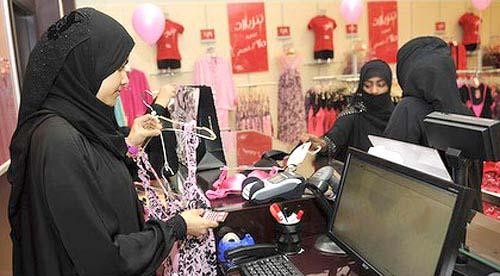JEDDAH: The Ministry of Labor is moving forward with plans to set up workplace nurseries and daycare centers and creating “a safe and friendly working environment for women,” according to Khalid Abalkhail, a ministry spokesman.
Abalkhail made the announcement Saturday on his Twitter account.
The ministry also has started implementing a new initiative to facilitate commuting for women to and from their workplaces in Jeddah and Riyadh. The initiative is in its pilot phase, according to Abalkhail.
Establishing nurseries and daycares at workplaces, as well as adjusting working hours for women to achieve a workplace/home balance, especially for mothers of infants and younger children, is part of the initiative.
Angham Bukhari, a lingerie and sleepwear store manager at Mall of Arabia in Jeddah, told Arab News that her company has been providing shuttle bus service to take employees to and from their workplaces. She said she does not know whether providing a safe and convenient commute is a requirement by the Ministry of Labor, but her employer has been providing that service for two years.
Starting this month, her company has collaborated with Careem. The company assigned SR1,500 a month for female employees to use a taxi service if buses do not reach their homes.
“There is a daycare at the mall now where I can leave my child during working hours,” said Bukhari, who is a mother of a 5-year-old. “I used to work for eight hours but now I work for six only. A colleague then takes over in the evening shift.”
Bukhari’s monthly basic salary is SR3,550 with added benefits and occasional bonuses that can bring it up to SR6,000. She still receives a transportation allowance even if she uses the shuttle bus service.
“We do not get lower salaries compared to our male counterparts due to working for six hours a day (with a weekly day off) instead of eight as this is a regulation from the Ministry of Labor,” she told Arab News. Bukhari said Saudi salesmen also work for six hours unlike non-Saudis who work longer hours.
Bukhari, who is expecting a second baby, added that maternity leave is three weeks. Additional time can be provided, although subject to an unpaid leave.
Sarah’s case is different. After being hesitant to speak to Arab News, she asked to be referred to as “Sarah” without confirming whether it was her real first name.
The 23-year-old, who works at a store that sells cosmetic products, needs to choose between receiving a SR500 transportation allowance, or taking a ride on the bus the company provides.
If they have children, her female colleagues must pay an average of SR350 a month to take their children to the nursery at the mall.
“I don’t have children, but I believe that this is difficult for mothers as they want to keep their children close,” she said. Sarah, who joined the store a year and a half ago, works eight hours daily and receives a monthly salary of SR3,500 including benefits.
At a department store that caters to female and male shoppers in one of Jeddah’s malls, women sales assistants whose salaries are below SR5,000 a month will be offered free rides on Careem following and arrangement with the employer.
“What I like the most about working here is that it’s at a mall and I have everything I need around me,” said Fatima, the manager of the female staff at the department store. “What is annoying is that the store is open until 11:30 p.m. and we sometimes get men coming after 11 p.m. and act in a way that bothers us. But now the security is aware of that and stops them from entering.”
Workingwomen have been more visible in shopping malls around the Kingdom during the past decade, since they replaced their male counterparts at women’s clothing stores.
The late former Minister of Labor Ghazi Al-Qusaibi took the initiative to ban salesmen from working at lingerie shops — a move that was hailed by women shoppers who found it easier to choose lingerie when surrounded by saleswomen.
In 2011, Saudi women started working as sales assistants and behind the tills at stores that sell women and children clothes that only allow entry for families.
Increasing the number of women’s participation in the workforce from 22 percent to 30 percent is among the goals of Saudi Vision 2030.
Arab News requested a clarification from the Labor Ministry’s spokesman Khalid Abalkhail, but he did not respond late Monday.
Saudi women find working environment improving, but obstacles remain
Saudi women find working environment improving, but obstacles remain

Reseda alba, an aromatic herb found across Saudi Arabia, plays vital role in fighting desertification

- Known by the common name white mignonette, reseda alba thrives in both sandy and clayey soils
- In springtime, the plant blooms, attracting bees and other pollinators, thereby enhancing ecological balance
ARAR: Reseda alba, a flowering aromatic herb, is naturally found in several regions of Saudi Arabia and is a key component of the local vegetation in the Northern Borders region.
Known by its common names white mignonette or white upright mignonette, the plant has small, white, fragrant flowers and is also cultivated as an ornamental plant. In springtime, reseda alba blooms, attracting bees and other pollinators, thereby enhancing ecological balance and supporting biodiversity.
Thriving in both sandy and clayey soils, the plant is well-suited to the desert climate of the Kingdom's Northern Borders region due to its drought-resistant nature. It also plays a vital role in combating desertification by stabilizing the soil.

A perennial plant that grows up to a meter tall, reseda alba is also native to Europe, Asia, and North Africa. It can also be found in other parts of the world as an introduced species.
Nasser Al-Mujlad, chair of the Aman Environmental Association, highlighted that the expansion of reseda alba is a key element of the region's natural botanical heritage, the Saudi Press Agency reported.
Al-Muilad pointed out that the plant's aesthetic appeal adds significant value to the region's tourism and environmental significance.
He further emphasized that many plants previously at risk of extinction have made a comeback, thanks to the establishment of reserves and the implementation of new regulations and laws aimed at protecting the environment and conserving its natural resources.
How Saudi Arabia is protecting users’ privacy and data from harmful AI

- AI technologies often collect sensitive personal data, raising concerns over consent, surveillance, and potential misuse
- Saudi Arabia is leading AI regulation in the region with ethical principles and a personal data protection law
RIYADH: As artificial intelligence seeps deeper into everyday life — from smart assistants and facial recognition to online shopping and AI-generated selfies — so too do the threats to personal data and privacy.
The dazzling capabilities of AI come at a cost many users do not fully grasp: exposure to data collection, surveillance, and potential misuse. And in a world where convenience often trumps caution, experts are urging users and organizations alike to slow down and scrutinize the digital tools they engage with.
“AI systems often depend on vast amounts of data, including sensitive personal information, which raises significant privacy issues,” Osama El-Masry, who leads data protection and privacy practice delivery for the Middle East region at the IT consulting firm Cognizant, told Arab News.
“Many users are unaware of how their data is collected, stored, and utilized, leading to fears of unauthorized access or misuse. For example, technologies like facial recognition can infringe on individual privacy without consent, posing risks of surveillance and tracking.”

This warning comes amid growing concerns about how AI software processes user data — especially in apps and platforms that seem harmless at first glance.
While regulation and ethical oversight are often viewed as a government or corporate responsibility, El-Masry stresses that users must also play an active role.
“This means reading privacy policies and being aware of what personal information is collected and how it may be used or shared,” he said.
“A critical aspect of this responsibility is limiting the sharing of personal data when using AI tools. Users should strive to provide only the minimum necessary information required to achieve their desired outcomes, avoiding unnecessary disclosure of sensitive data.”
In short, treat AI tools like you would any new technology: with a mix of curiosity and caution. The onus is on users to learn how their data is handled and to be wary of oversharing. On the flip side, organizations must prioritize privacy from the very beginning of product design.
“This involves implementing strong data protection measures, ensuring transparency and explainability in data usage, and adhering to AI and privacy regulations/principles,” El-Masry said. “Organizations should also clearly communicate their data practices to users, fostering an environment of trust.
“Ultimately, a collaborative approach, where both parties understand their roles and responsibilities regarding privacy, is essential for protecting personal information in the age of AI.
“By working together, users and organizations can create a more secure digital landscape that respects privacy rights.”
Take the current obsession with AI art filters, for instance. Millions of users upload their photos to apps that transform them into anime characters or classic oil paintings. But what happens to those original images?
“Many users may not realize that while the effect is fun, their original images are still being processed and may be retained by the app,” said El-Masry.
“This underscores the importance of being mindful about which platforms and applications are trusted with personal images and data. By taking these steps, users can harness AI’s potential while safeguarding their personal information against misuse.”
It’s a simple but powerful reminder: Just because something looks like harmless fun, doesn’t mean it’s risk-free. Every interaction with AI — no matter how trivial it seems — carries data implications.

Users are also advised to challenge the information they receive from AI platforms. While many tools promise personalization and convenience, they can just as easily perpetuate bias or inaccuracies.
“Continuous education about AI ethics and privacy implications empowers users to make informed choices about their interactions with these technologies,” said El-Masry. “Users should also advocate for ethical data practices within their communities, promoting accountability among developers and organizations.
“It’s important to recognize that AI applications vary widely, with some being non-privacy-related, such as telecom network enhancements and medical diagnostics, and others being privacy-sensitive, like marketing profiling and predictive analysis.
“Users should be particularly cautious when interacting with AI technologies in privacy-sensitive fields, as these applications often involve the handling of personal data that can impact privacy rights.”
There are ways to navigate the AI landscape safely. One approach is to seek out AI tools that prioritize user privacy through transparent practices and robust protection measures.
“By taking these steps, users can harness AI’s potential while safeguarding their personal information against misuse,” said El-Masry.
The stakes are higher than many realize. As AI becomes more sophisticated and integrated into business, healthcare, finance, education, and government systems, the implications for misuse — whether accidental or malicious — become more severe.
El-Masry lists several privacy threats tied to AI applications, including “unintended biased decisions, unethical AI use cases, data leaks, decisions ambiguity, and the use of AI with vulnerable data subjects.
“This is becoming a global concern and the driver for the issuance of the different ethical AI regulations/principles by many policymakers across different regions and countries to mitigate the above risks associated with the use of AI.

While much of the world is still struggling to keep pace with innovation, Saudi Arabia has moved to regulate and promote the ethical use of data and AI.
“The Kingdom introduced the Personal Data Protection Law, which establishes clear guidelines for data collection, processing, and sharing, ensuring that individuals’ privacy rights are protected,” said El-Masry.
“This framework aligns with international standards, signaling a commitment to responsible data management.”
The country’s National Strategy for Data and Artificial Intelligence is another critical piece of its governance efforts. It aims to build a culture of innovation without compromising ethical boundaries.
“Notably, SDAIA has issued a set of ethical AI principles that emphasize fairness, accountability, transparency, and privacy,” said El-Masry. “These principles guide the development and deployment of AI technologies, ensuring they are used responsibly and ethically.”
Despite Saudi Arabia’s leadership, data privacy in the broader Middle East remains patchy. Many countries still lack comprehensive legal frameworks to protect users’ rights.
El-Masry believes that’s an area ripe for action. “Governments should establish comprehensive AI and data privacy laws and regulations that align with international standards, providing clear guidelines for data processing.”
DID YOU KNOW?
• Saudi Arabia has introduced the Personal Data Protection Law to safeguard user privacy and regulate data use responsibly.
• The Kingdom’s National Strategy for Data and AI promotes innovation while ensuring ethical, transparent, and accountable AI practices.
• SDAIA’s ethical AI principles emphasize fairness, privacy, and governance, guiding responsible development and deployment of AI technologies.
He also advocates for coordinated public-private collaboration to raise the bar for compliance and innovation across the region.
“Organizations must prioritize compliance and even go beyond compliance and acknowledge the value of investing in implementing data responsibility practices and technologies that ensure robust privacy compliance and AI governance in conducting business, which has a direct impact on their revenues and sustainability. There are clear examples of private organizations who adopted this approach and (have) proven to be competitive and successful.
“Organizations should communicate their data practices clearly to build public trust. Additionally, mandating that organizations document AI use cases involving personal data and ensuring periodic reviews of AI algorithms can help maintain compliance with privacy regulations.
“Governments can support this by providing resources, consultation, and training to enhance organizations’ privacy and AI governance capabilities.”
While legislation and corporate responsibility are critical, El-Masry says individuals must also be empowered to take charge of their own digital lives. He calls for greater awareness and education around data privacy.
“By adopting a proactive and unified approach, both organizations and governments can create a safer digital environment that prioritizes privacy for all,” he said.
As AI becomes increasingly entangled in the infrastructure of modern life, protecting privacy is no longer a niche concern — it’s a collective responsibility. From the laws that govern AI to the choices we make about which apps to trust, the future of digital safety depends on everyone playing their part.
As El-Masry puts it: “By working together, users and organizations can create a more secure digital landscape that respects privacy rights.”

Saudi and French experts explore opportunities for cooperation in sustainable agriculture

Saudi Arabia’s National Research and Development Center for Sustainable Agriculture, also known as Estidamah, welcomed a delegation from the French National Federation of Seed Potato Growers for an official visit during which they discussed opportunities for enhanced cooperation and exchanges of expertise.
The visitors learned about the center’s activities, including its research and technical programs and prominent projects that support the development of sustainable agricultural solutions in the Kingdom.
The center said the visit reflected its commitment to building strategic partnerships with leading international organizations, and the sharing of experience that can contribute to the development of the agricultural sector and improved food security.
The French federation, which specializes in support and development of potato seed production, oversees a number of research and technical institutions.
AlUla Skies Festival 2025 returns next week

- The festival features a variety of additional activities, including illuminated hot air balloon shows, tethered-flight and free-flight balloon rides over AlUla’s iconic landmarks, and musical concerts blending culture, exploration and entertainment
RIYADH: AlUla Moments has announced the return of the “AlUla Skies Festival 2025” from April 18 to 27, featuring a variety of new experiences.
The festival highlights the area’s clear, light-pollution-free skies and AlUla’s deep, ancient connection to astronomy, as it is home to Gharameel and AlUla’s Beacon, the first designated Dark Sky locations in the Middle East, recognized by the International Dark-Sky Association, solidifying AlUla’s status as a global hub for astro-tourism.
The festival offers visitors a rare opportunity to stargaze in a pristine natural environment, showcasing IDA-certified locations such as Gharameel and AlUla’s Beacon.
These spots are among the first official Dark Sky Sites in the region, reinforcing AlUla’s role as a leading destination for stargazing tourism.
Visitors can head to the Gharameel Reserve to view the Milky Way in one of the clearest skies in the region. The experience also includes night walks, camping sessions and grilled dinners around campfires.
The festival features a variety of additional activities, including illuminated hot air balloon shows, tethered-flight and free-flight balloon rides over AlUla’s iconic landmarks, and musical concerts blending culture, exploration and entertainment.
For more information about the AlUla Skies Festival, visitors can check the official website: https://www.experiencealula.com/en.
SFDA CEO meets German food safety president

- The meeting took place as part of the bilateral engagements on the sidelines of the sixth meeting of the International Heads of Food Agencies Forum, held in Chile from April 9-11
RIYADH: The chief executive officer of the Saudi Food and Drug Authority, Dr. Hisham S. Aljadhey, on Thursday met in Santiago with President of the German Federal Institute for Risk Assessment Dr. Andreas Hensel.
The meeting took place as part of the bilateral engagements on the sidelines of the sixth meeting of the International Heads of Food Agencies Forum, held in Chile from April 9-11.
According to a press release from the SFDA, both sides underscored the crucial role of regulatory authorities in forging robust partnerships with the private sector.
This collaboration is vital for developing and improving product quality, driving progress, and enhancing operational efficiency within a unified system that prioritizes product safety.
Discussions also centered on the importance of establishing an integrated regulatory system underpinned by reliable reference data, accurate quality testing, and transparent regulatory frameworks.
This foundation will foster greater confidence in regulatory information, improve the capacity for proactive risk assessment and response, and ultimately enhance product reliability and food safety.
Officials from the SFDA delegation also conducted a series of bilateral meetings with several counterpart regulatory bodies, including the UK Food Standards Agency, the Chilean Food Safety and Quality Agency, the New Zealand Food Safety branch of the Ministry of Primary Industries, and the Portuguese Economic and Food Safety Authority.
These meetings were geared toward fostering cooperation frameworks and enhancing integrated work with international organizations to serve food quality and safety objectives.























